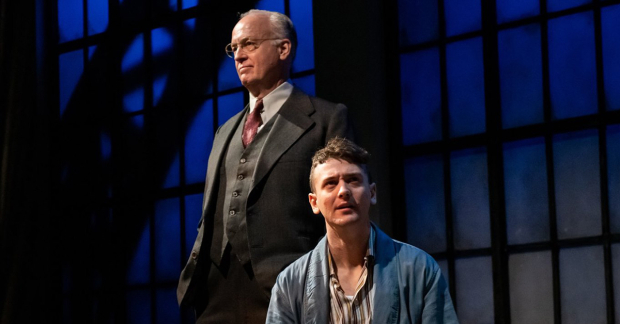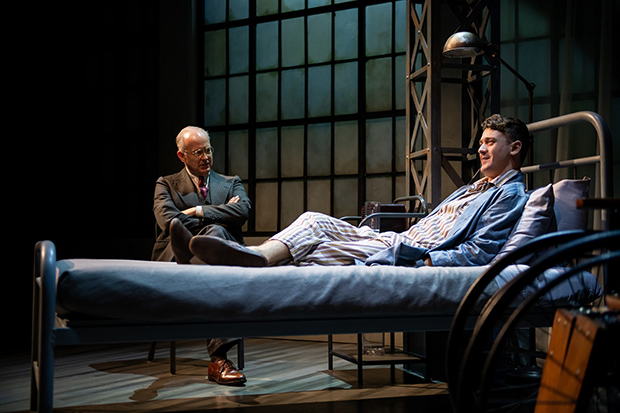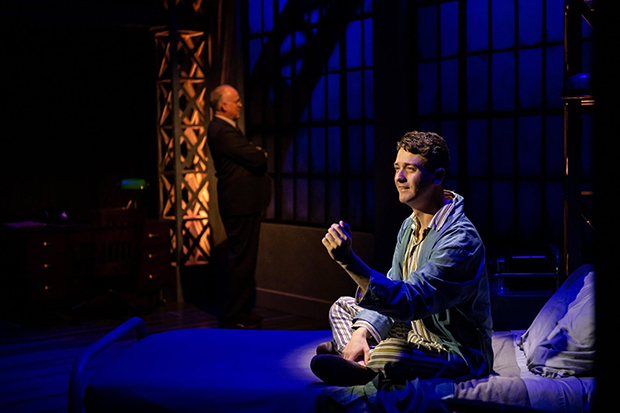Interview: Father and Son Reed Birney and Ephraim Birney, Together Onstage in Chester Bailey
The new drama is currently running at Barrington Stage Company.
Tony winner Reed Birney wasn't sure if he'd ever do theater again when he got the script for Joseph Dougherty's play Chester Bailey. But the idea was too good to pass up. He had known the director, Ron Lagomarsino, forever, and his co-star in the two-hander — about a doctor trying to heal a young man after a devastating assault — would be an actor named Ephraim Birney, who happens to be his son.
So Birney couldn't say no, and thus began a journey that took the father and son to West Virginia's Contemporary American Theatre Festival in 2019, and now, after a pandemic-related delay of a year, to Barrington Stage Company, where the drama runs through July 3. The play (and the 90-minute drive to and from the theater every night from their home in the Catskills) presents a unique opportunity for the Birneys to discover each other in a new light, as actors and professional colleagues, not family members, and boy, are they having a great time.

(© Seth Freeman)
This conversation has been condensed and edited for clarity.
Which came first: the Reed or the Ephraim?
Ephraim Birney: I got an audition with [casting director] Pat McCorkle and I went in for Ed Herendeen, who is the main guy at Contemporary American Theatre Festival down in West Virginia. They were both so sweet, and they told me that it was tricky material. I got called back, and I was feeling pretty good about how it went down, and that's when they started talking to me about, if I were to get the part, if dad would be interested in coming on with me, because he knew the director, Ron Lagomarsino. And you said no way.
Reed Birney: Ron and I did Hay Fever with Joanne Woodward in 1982, when we were just children, and we've been friendly since. I had heard that Ephram had this audition and that Ron was the director, so I wrote Ron and said, "That's so amazing, my boy is coming in for your play," and he never said a word to me about me being in it. I think they really wanted to make sure that Ephraim knew he got it on his own.
Way down the line in his process, they reached out to me, and I was sort of not interested in doing theater again, so I told Ephraim I didn't think I could do it. Then, I started to think that if I said no, I would regret it for the rest of my life. I knew it would be a special and important experience for both of us, and we had a great time in West Virginia in 2019. Julie Boyd from Barrington had read the play before it was at Contemporary American Theatre Festival, and she had committed by Christmas of 2019 to do it in April 2020. And then, of course, the world ended.
What was it like doing the play together in Virginia?
Ephraim: It became—
Reed: —Mommie Dearest. No, I think we were both really nervous about—
Ephraim: —What it would be like in the room. We have a really good kind of banter and friendship, along with being father and son, so once the room was opened up to us and I could see how not seriously dad takes his job—
Reed: —That's the headline right there.
Ephraim: —Especially since the play is just the two of us, it's a lot of goofing around. There were a lot of things that I always…Not regretted doing, or resented about the rehearsal process, but that I would get tired of.
Reed: He doesn't love table work.
Ephraim: But things like that really took off in a new light after seeing how you approach them.
Reed: I think we were both impressed by how quickly we became colleagues in the room. That was surprising and really gratifying.

(© Seth Freeman)
Ephraim, did you feel an added pressure knowing that your dad is this beloved actor?
Ephraim: Yeah. The joke that I tell my friends is that, in all senses of it, if you put this on paper, it looks like the actor's nightmare. You're doing a play with one other person and he's your Tony Award-winning father. I knew he was going to be really good, and I went into it like, "OK, we're not going to embarrass each other, I hope."
Reed: I don't think Ephraim is terribly starstruck around me, and he's really good in the play. That was the most fun for me, to see how great he is. Every once in a while I would go, "Well, look at him." But it's like doing a play with anybody. Because we know each other so well, there's an added resonance for both of us. And I actually feel way more confident in this production than I did in West Virginia.
Ephraim: I feel similarly. By the end of week one of rehearsals, we were doing run-throughs of the play.
Reed: It came back to us fast.
Have you had to contend with the idea of separating work and life? Do you talk shop in the car ride home?
Ephraim: When we did it in West Virginia, there would be ride-backs where I would certainly say, "I was staring right through you. I don't know what I was thinking." But we both understand, when you do this, there are days like that. There was never any kind of judgment involved.
Reed: I think Ephraim was really worried that I would be giving him notes. And it never once occurred to me, honestly. He was that good. Driving down to West Virginia, he said, "I'm a little worried about my accent," because he's supposed to have a Brooklyn accent, and I said, "Let me hear some of it." He sounded like John Kennedy. And then miraculously, on the third day of rehearsal, he had this perfect Brooklyn, '40s, Bowery Boys accent. I don't know where it came from. I didn't hear him practice it. He says he has a friend who sounds like that. I know this friend and he does not talk that.
Ephraim: When we talk, we talk like that.
Reed: It was incredibly effective. I suppose if he asked me something about how to do a moment, I would tell him. But I generally don't direct my fellow actors. Some people do. But I don't. I'm wondering, too, from an audience perspective, what it must be like for them. Because we don't play father and son. So does that inform people watching the play? It must be kind of a mind-bender for them. You heard some people say they didn't even realize.
Ephraim: There were people that, the last time we did it, were looking at the programs on the way out and going, "Wait a minute now!"

(© Seth Freeman)







